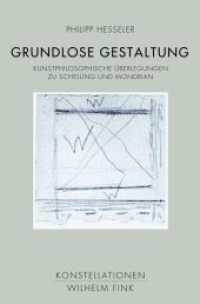- ホーム
- > 洋書
- > 英文書
- > Cinema / Film
Full Description
Bad Sex traces the evolution of representations of sex on screen, from earlier portrayals of sex as glamorous or taboo, to more complex depictions of often awkward or painful experiences and feelings.
Jacqueline Gibbs, Billy Holzberg, and Aura Lehtonen examine the representation of sex and sexuality in contemporary English language drama and 'dramedy' shows like Fleabag (2016, 2019), Sex Education (2019-23), I May Destroy You (2020) and Euphoria (2019-), arguing that TV is where the politics of sexuality and gender is negotiated under the contemporary conditions of neoliberalism.
Through a cultural analysis of key television shows, they identify this shift as driven by the diversification of representations of sex and sexuality, as women, trans and non-binary, Black and minority ethnic, working-class and disabled TV professionals carve some space in a traditionally white, middle-class, cis male dominated industry. In doing so, they explore the affective potential and limits of 'bad' sex on our screens and what these representations can tell us about sexual politics and gender cultures today.
Contents
Introduction - Bad Sex on the Small Screen
1.Bad Straight Sex and Heteropessimism in Fleabag
2.Good Sex as Queer/Lesbian Escape in Feel Good and Work in Progress
3.Gay Male Shame and Good Enough Sex in Please Like Me and Special
4.When Sex Was Still Good in It's a Sin and Pose
5.Sex with Your Ex in And Just Like That..., The L Word: Generation Q and Queer as Folk
6.Beyond the Boundaries of Bad Sex in I May Destroy You
7.Unlearning Bad Sex in Euphoria and Sex Education
Conclusion - No Sex, or The End of Bad Sex?
Bibliography
TV Show and Film Bibliography








